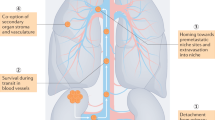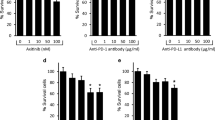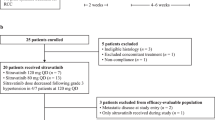Abstract
FDA approval of the multitargeted, antiangiogenic tyrosine kinase inhibitors (TKIs) sunitinib and sorafenib, and the serine and threonine mammalian target of rapamycin inhibitor, temsirolimus, has revolutionized the management of metastatic clear-cell renal-cell carcinoma (CC-RCC). The inability of these targeted therapies to provide durable complete responses, however, is a serious limiting factor to their clinical usefulness. Although immunotherapeutic approaches in advanced disease are increasingly regarded as a historical treatment paradigm, we propose that a fundamental understanding of immunobiology in CC-RCC can improve the selection of patients for high-dose intravenous interleukin 2 and facilitate the development of novel immunotherapeutic strategies. In our opinion, immunotherapeutic strategies have an important place in the management of advanced CC-RCC in the era of biological targeted therapy.
Key Points
-
Tumor immunology is highly complex and is dependent on both tumor and host factors
-
High-dose interleukin 2 is the only therapy that can cure a minority of patients with metastatic clear-cell renal-cell carcinoma (CC-RCC); interferon alpha can also induce durable complete responses but in comparatively fewer patients
-
CC-RCC histopathology and carbonic anhydrase IX immunohistochemistry has the potential to optimize the selection of patients for high-dose interleukin 2 immunotherapy
-
Immunotherapies based on anti-tumor-associated-antigen strategies, such as vaccines, are currently undergoing clinical trials, but no agent has demonstrated survival benefit in metastatic CC-RCC
-
Disease response evaluation and the utility of RECIST (Response Evaluation Criteria In Solid Tumors) have to be formally re-assessed for immunotherapy trials
-
Translational studies within immunotherapy clinical trials will be vital to identify biomarkers of disease response and to develop a better overall understanding of tumor immunology
This is a preview of subscription content, access via your institution
Access options
Subscribe to this journal
Receive 12 print issues and online access
$209.00 per year
only $17.42 per issue
Buy this article
- Purchase on Springer Link
- Instant access to full article PDF
Prices may be subject to local taxes which are calculated during checkout




Similar content being viewed by others
References
UK Kidney Cancer Statistics. Cancer Research UK [online], (2008).
Cancer Facts & Figures 2008. American Cancer Society [online], (2008).
Murai, M. & Oya, M. Renal Cell carcinoma: etiology, incidence and epidemiology. Curr. Opin. Urol. 14, 229–233 (2004).
Montie, J. E. et al. The role of adjunctive nephrectomy in patients with metastatic renal cell carcinoma. J. Urol. 117, 272 (1977).
Dekernion, J. B., Ramming, K. P. & Smith, R. B. The natural history of metastatic renal cell carcinoma: a computer analysis. J. Urol. 120, 148–152 (1978).
Marcus, S. G. et al. Regression of metastatic renal cell carcinoma after cytoreductive nephrectomy. J. Urol. 150, 463–466 (1993).
Fyfe, G. et al. Results of treatment of 255 patients with metastatic renal cell carcinoma who received high-dose recombinant interleukin-2 therapy. J. Clin. Oncol. 13, 688–696 (1995).
Jonasch, E. & Haluska, F. G. Interferon in oncological practice: review of interferon biology, clinical applications, and toxicities. Oncologist 6, 34–55 (2001).
Upton, M. P., Parker, R. A., Youmans, A., McDermott, D. F. & Atkins, M. B. Histologic predictors of renal cell carcinoma response to interleukin-2 based therapy. J. Immunother. 28, 488–495 (2005).
Atkins, M. et al. Carbonic anhydrase IX expression predicts outcome of interleukin 2 therapy for renal cancer. Clin. Cancer. Res. 11, 3714–3721 (2005).
Motzer, R. J. et al. Sunitinib versus interferon alfa in metastatic renal-cell carcinoma. N. Engl. J. Med. 356, 115–124 (2007).
Hudes, G. et al. Temsirolimus, interferon alfa, or both for advanced renal-cell carcinoma. N. Engl. J. Med. 356, 2271–2281 (2007).
Lukashev, D., Sitkovsky, M. & Ohta, A. From 'Hellstrom Paradox' to anti-adenosinergic cancer immunotherapy. Purinergic Signal. 3, 129–134 (2007).
Kavanaugh, D. Y. & Carbone, D. P. Immunological dysfunction in cancer. Hematol. Oncol. Clin. North Am. 10, 927–952 (1996).
Pederson, A. E. & Ronchese, F. CTLA-4 blockade during dendritic cell based booster vaccination influences dendritic cell survival and CTL expansion. J. Immune Based Ther. Vaccines 5, 1–6 (2007).
Wang, R. F. Regulatory T cells and toll-like receptors in cancer therapy. Cancer Res. 66, 4987–4990 (2006).
Kavanagh, B. et al. CTLA-4 blockade expands FoxP3+ regulatory and activated effector CD4+ T cells in a dose-dependent fashion. Blood 112, 1175–1183 (2008).
Siddiqui, S. A. et al. Tumor-infiltrating Foxp3−CD4+CD25+ T cells predict poor survival in renal cell carcinoma. Clin. Cancer Res. 13, 2075–2081 (2007).
Sitkovsky, M. & Lukashev, D. Regulation of immune cells by local-tissue oxygen tension: HIF1 alpha and adenosine receptors. Nat. Rev. Immunol. 5, 712–721 (2005).
Kim, J. W. & Dang, C. V. Cancer's molecular sweet tooth and the Warburg effect. Cancer Res. 66, 8927–8930 (2006).
Koukourakis, M., Giatromanolaki, A., Simopoulos, C., Polychronidis, A. & Sivridis, E. Lactate dehydrogenase 5 (LDH5) relates to up-regulated hypoxia inducible factor pathway and metastasis in colorectal cancer. Clin. Exp. Metastasis 22, 25–30 (2005).
Fischer, K. et al. Inhibitory effect of tumor cell-derived lactic acid on human T cells. Blood 109, 3812–3819 (2007).
Ohta, A. et al. A2A adenosine receptor protects tumors from antitumor T cells. Proc. Natl Acad. Sci. USA 103, 13132–13137 (2006).
Novitskiy, S. V. et al. Adenosine receptors in regulation of dendritic cell differentiation and function. Blood 112, 1822–1831 (2008).
Deaglio, S. et al. Adenosine generation catalysed by CD39 and CD73 expressed on regulatory T cells mediates immune suppression. J. Exp. Med. 204, 1257–1265 (2007).
Raval, R. R. et al. Contrasting properties of hypoxia-inducible factor 1 (HIF-1) and HIF-2 in von Hippel-Lindau-associated renal cell carcinoma. Mol. Cell. Biol. 25, 5675–5686 (2005).
Khan, Z. A. et al. EDB fibronectin and angiogenesis: a novel mechanistic pathway. Angiogenesis 8, 183–196 (2005).
Amato, R. J. 5T4-modified vaccinia Ankara: progress in tumor-associated antigen-based immunotherapy. Expert Opin. Biol. Ther. 7, 1463–1469 (2007).
Bui, M. H. et al. Carbonic anhydrase IX is an independent predictor of survival in advanced renal clear cell carcinoma: implications for prognosis and therapy. Clin. Cancer Res. 9, 802–811 (2003).
Doran, B., Rogers, P., Jones, D., Green, C. & Courtenay-Luck, N. Evaluation of the potential for targeted therapy of renal carcinoma and metastatic melanoma with huBC1-huIL12 (AS1409), a potent immunocytokine [abstract]. AACR Meeting Abstracts 922 (2007).
Johnson, B. J., Clay, T. M., Hobeika, A. C., Lyerly, H. K. & Morse, M. A. Vascular endothelial growth factor and immunosuppression in cancer: current knowledge and potential for new therapy. Expert Opin. Biol. Ther. 7, 449–460 (2007).
Ye, F. et al. Vascular endothelial growth factor (VEGF) and ovarian carcinoma cell supernatant activate signal transducers and activators of transcription (STATs) via VEGF receptor-2 (KDR) in human hemopoietic progenitor cells. Gynecol. Oncol. 94, 125–133 (2004).
Fujita, M. et al. Inhibition of STAT3 promotes the efficacy of adoptive transfer therapy using type-1 CTLs by modulation of the immunological microenvironment in a murine intracranial glioma. J. Immunol. 180, 2089–2098 (2008).
Thompson, R. H. et al. Costimulatory B7-H1 in renal cell carcinoma patients: Indicator of tumor aggressiveness and potential therapeutic target. Proc. Natl Acad. Sci. USA 101, 17174–17179 (2004).
Crispen, P. L. et al. Tumor cell and tumor vasculature expression of B7-H3 predict survival in clear cell renal cell carcinoma. Clin. Cancer Res. 14, 5150–5157 (2008).
Biswas, S. K., Sica, A. & Lewis, C. E. Plasticity of macrophage function during tumor progression: regulation by distinct molecular mechanisms. J. Immunol. 180, 2011–2017 (2007).
Lin, E. Y. et al. Macrophages regulate the angiogenic switch in a mouse model of breast cancer. Cancer Res. 66, 11238–11246 (2006).
Sica, A. et al. Autocrine production of IL-10 mediates defective IL-12 production and NF-kB activation in tumor-associated macrophages. J. Immunol. 164, 762–767 (2000).
Nagaraj, S. & Gabrilovich, D. I. Tumor escape mechanism governed by myeloid-derived suppressor cells. Cancer Res. 68, 2561–2563 (2008).
Shojaei, F. et al. Bv8 regulates myeloid-cell-dependent tumour angiogenesis. Nature 450, 825–831 (2007).
Shojaei, F. & Ferrara, N. Refractoriness to antivascular endothelial growth factor treatment: role of myeloid cells. Cancer Res. 68, 5501–5504 (2008).
Karin, M., Lawrence, T. & Nizet, V. Innate immunity gone awry: linking microbial infections to chronic inflammation and cancer. Cell 124, 823–835 (2006).
Lin, W. W. & Karin, M. A cytokine-mediated link between inate immunity, inflammation, and cancer. J. Clin. Invest. 117, 1175–1183 (2007).
Laheru, D. A., Pardoll, D. M. & Jaffee, E. M. Genes to vaccines for immunotherapy: how the molecular biology revolution has influenced cancer immunology. Mol. Cancer Ther. 4, 1645–1652 (2005).
Tseng, S. Y. et al. B7-DC, a new dendritic cell molecule with potent costimulatory properties for T cells. J. Exp. Med. 193, 839–846 (2001).
Rosenberg, S. A. Interleukin 2 for patients with renal cancer. Nat. Clin. Pract. Oncol. 4, 497 (2007).
McDermott, D. F. et al. Randomized phase III trial of high-dose interleukin-2 versus subcutaneous interleukin-2 and interferon in patients with metastatic renal cell carcinoma. J. Clin. Oncol. 23, 133–141 (2005).
Yang, J. C. et al. Randomized study of high-dose and low-dose interleukin-2 patients in patients with metastatic renal cell cancer. J. Clin. Oncol. 21, 3127–3132 (2003).
Negrier, S. et al. Medroxyprogesterone, interferon alfa-2a, interferon-2a, interleukin 2, or combination of both cytokines in patients with metastatic renal carcinoma of intermediate prognosis: results of a randomized controlled trial. Cancer 110, 2460–2477 (2007).
Coppin, C. et al. Immunotherapy for advanced renal cell cancer. Cochrane Database Syst. Rev. 1, CD001425 (2005).
Flanigan, R. C. et al. Nephrectomy followed by interferon-α2b compared with interferon-α2b alone for metastatic renal cell cancer. N. Engl. J. Med. 345, 1655–1659 (2001).
Mickisch, G. H. et al. Radical nephrectomy plus interferon-α based immunotherapy compared with interferon-α alone in metastatic renal cell carcinoma: a randomised trial. Lancet 358, 966–970 (2001).
Fleshner, N. et al. The role of cytoreductive nephrectomy in metastatic renal cell cancer: a clinical practice guideline. Cancer Care Ontario [online], (2006).
Gore, M. E. on behalf of the RE04 investigators. Interferon-α (IFN), interleukin-2 (IL2) and 5-fluorouracil (5FU) vs IFN alone in patients with metastatic renal cell carcinoma (mRCC): results of the randomized MRC/EORTC REO4 trial [abstract]. ASCO Meeting Abstracts 26, 5039 (2008).
Aass, N. et al. Randomized phase II/III trial of interferon alfa-2a with and without 13-cis-retinoic acid in patients with progressive metastatic renal cell carcinoma: the European Organization for Research and Treatment of Cancer Genito-Urinary Tract Cancer Group (EORTC 30951). J. Clin. Oncol. 23, 4172–4178 (2005).
Escudier, B. et al. A randomized, controlled, double-blind phase III study (AVOREN) of bevacizumab/interferon-α2a vs placebo/interferon-α2a as first-line therapy in metastatic renal cell carcinoma [abstract]. ASCO Meeting Abstracts 25, 3 (2007).
Rini, B. I. et al. Bevacizumab plus interferon alfa compared with interferon alfa monotherapy in patients with metastatic renal cell carcinoma: CALGB 90206. J. Clin. Oncol. 26, 5422–5428 (2008).
Escudier, B. J. et al. Update on AVOREN trial in metastatic renal cell carcinoma (mRCC): Efficacy and safety in subgroups of patients (pts) and pharmacokinetic (PK) analysis [abstract]. ASCO Meeting Abstracts 26, 5025 (2008).
Mekhail, T. M. et al. Validation and extension of the Memorial Sloan–Kettering prognostic factors model for survival in patients with previously untreated metastatic renal cell carcinoma. J. Clin. Oncol. 23, 832–841 (2005).
Jocham, D. et al. Adjuvant autologous renal tumor cell vaccine and risk of tumor progression in patients with RCC after radical nephrectomy: phase III, randomized controlled trial. Lancet 363, 594–599 (2004).
Doehn C., Richter, A., Theodor, R. A., Lehmacher, W. & Jocham, D. Prolongation of progression-free and overall survival following an adjuvant vaccination with Reniale® in patients with non-metastatic renal cell carcinoma: Secondary analysis of a multicenter phase-III trial. Deutscher Krebskongress [online], (2006).
Wood, C. et al. An adjuvant autologous therapeutic vaccine (HSPCC-96; vitespen) versus observation alone for patients at high risk of recurrence after nephrectomy for renal cell carcinoma: a multicentre, open-label, randomised phase III trial. Lancet 372, 145–154 (2008).
Donskov, F. & von der Maase, H. Impact of immune parameters on long-term survival in metastatic renal cell carcinoma. J. Clin. Oncol. 24, 1997–2005 (2006).
van der Vliet, H. J. et al. Effects of the administration of high-dose interleukin-2 on immunoregulatory cell subsets in patients with advanced melanoma and renal cell cancer. Clin. Cancer Res. 13, 2100–2108 (2007).
Pantuck, A. J. et al. Gene expression and tissue microarray analysis of interleukin-2 complete responders in patients with metastatic renal cell carcinoma [abstract]. ASCO Meeting Abstracts 23, 4535 (2005).
Hutson, T. E. & Quinn D. I. Cytokine therapy: a standard of care for metastatic renal cell carcinoma? Clin. Genitourin. Cancer 4, 181–186 (2005).
Yang, J. C. et al. Ipilimumab (anti-CTLA antibody) causes regression of metastatic renal cell cancer associated with enteritis and hypophysitis. J. Immunother. 30, 825–830 (2007).
Denileukin Diftitox in Treating Patients With Metastatic Melanoma or Metastatic Kidney Cancer. ClinicalTrials.gov [online], (2009).
Denileukin Diftitox and Interleukin-2 in Treating Patients With Metastatic Kidney Cancer. ClinicalTrials.gov [online], (2009).
Fricke, I. et al. Vascular endothelial growth factor-trap overcomes defects in dendritic cell differentiation but does not improve antigen-specific immune responses. Clin. Cancer Res. 13, 4840–4848 (2007).
McDermott, D. F. Update on the application of interleukin-2 in the treatment of renal cell carcinoma. Clin. Cancer Res. 13, 716s–720s (2007).
Passalacqua, R. et al. Bevacizumab (B) plus low-doses immunotherapy (IT) plus chemotherapy (CT) (BIC) in metastatic renal cell cancer (mRCC): Antitumor effects and variations of T-regulator cells (Treg) and other T-lymphocytes subsets. A study of the Italian Oncology Group for Clinical Research (GOIRC) [abstract]. ASCO Meeting Abstracts 26, 5121 (2008).
Ryan, C. W. et al. Sorafenib plus interferon-α2b (IFN) as first-line therapy for advanced renal cell carcinoma (RCC): SWOG 0412 [abstract]. ASCO Meeting Abstracts 24, 4525 (2006).
Goldman, B. H. et al. Clinical and molecular factors predictive of outcome with first-line sorafenib-based therapy in advanced renal carcinoma (RCC): An analysis of SWOG 0412 [abstract]. ASCO Meeting Abstracts 25, 5108 (2007).
Hipp, M. H. et al. Sorafenib, but not sunitinib, affects function of dendritic cells and induction of primary immune responses. Blood 111, 5610–5620 (2008).
Bleumer, I. et al. A phase II trial of chimeric monoclonal antibody G250 for advanced renal cell carcinoma patients. Br. J. Cancer 90, 985–990 (2004).
Bleumer, I. et al. A clinical trial with chimeric monoclonal antibody WX-G250 and low dose interleukin-2 pulsing scheme for advanced renal cell carcinoma. J. Urol. 175, 57–62 (2006).
Monoclonal Antibody Therapy (Rencarex®) in Treating Patients Who Have Undergone Surgery for Non-Metastatic Kidney Cancer. ClinicalTrials.gov [online], (2009).
AS1409 (huBC1–huIL12), Antisoma [online], (2007).
White, E. S., Baralle, F. E. & Muro, A. F. New insights into form and function of fibronectin splice variants. J. Pathol. 216, 1–14 (2008).
Bendall, J. K., Heymes, C., Ratajczak, P. & Samuel, J. L. Extracellular matrix and cardiac remodelling. Arch. Mal. Coeur Vaiss. 95, 1226–1229 (2002).
TroVax Renal Immunotherapy Survival Trial. ClinicalTrials.gov [online], (2008).
Hernandez-McClain, J. et al. Vaccination of renal cell cancer (RCC) patients with modified vaccinia Ankara delivering the tumor antigen 5T4 (TroVax [T]) administered + low dose interleukin-2 (IL-2): A phase II trial [abstract]. ASCO Meeting Abstracts 26, 5101 (2008).
Uemura, H. et al. A phase I trial of vaccination of CA9-derived peptides for HLA-A24-positive patients with cytokine-refractory metastatic renal cell carcinoma. Clin. Cancer Res. 12, 1768–1775 (2006).
Lens, M., Ferrucci, P. F. & Testori, A. Anti-CTLA4 Monoclonal Antibody Ipilimumab in the Treatment of Metastatic Melanoma: Recent Findings. Recent Pat. Anti-Cancer Drug Discov. 3, 105–113 (2008).
Finke, J. H. et al. Sunitinib reverses type-1 immune suppression and decreases T-regulatory cells in renal cell carcinoma patients. Clin. Cancer Res. 14, 6674–6682 (2008).
van Cruijsen, H. et al. Sunitinib-induced myeloid lineage redistribution in renal cell cancer patients: CD1c+ dendritic cell frequency predicts progression-free survival. Clin. Cancer Res. 14, 5884–5892 (2008).
Biswas, S. et al. Cytoreductive nephrectomy in metastatic clear-cell renal cell carcinoma: perspectives in the tyrosine kinase inhibitor era. Oncologist 14, 52–59 (2009).
Biswas, S. et al. Adjuvant therapies in primary clear-cell renal carcinoma; in recent advances in renal cell carcinoma (RCC). Int. Oncol. Updat. 53–77 (2008).
Rini, B. I. et al. Allogenic stem-cell transplantation of RCC after non-myeloablative chemotherapy: feasibility, engraftment, and clinical results. J. Clin. Oncol. 20, 2017–2024 (2002).
Takahashi, Y. et al. Regression of human kidney cancer following allogenic stem cell transplantation is associated with recognition of an HERV-E antigen by T-cells. J. Clin. Invest. 118, 1099–1109 (2008).
National Cancer Institute Clinical Trials. National Cancer Institute [online], (2009).
June, C. H. Adoptive T-cell therapy for cancer in the clinic. J. Clin. Invest. 117, 1466–1476 (2007).
Manegold, C. et al. Randomized phase II trial of a toll-like receptor 9 agonist oligodeoxynucleotide, PF-3512676, in combination with first-line taxane plus platinum chemotherapy for advanced-stage non-small-cell lung cancer. J. Clin. Oncol. 26, 3979–3986 (2008).
Murillo, O. et al. Potentiation of therapeutic immune responses against malignancies with monoclonal antibodies. Clin. Cancer Res. 9, 5454–5464 (2003).
Author information
Authors and Affiliations
Corresponding author
Ethics declarations
Competing interests
S. Biswas declares no competing interests. T. Eisen is a Consultant for Bayer, Pfizer, Schering Plough and Wyeth; he is on the Speakers bureau for Bayer, Pfizer and Wyeth and receives grant/research support from Bayer, Pfizer and Schering Plough.
Rights and permissions
About this article
Cite this article
Biswas, S., Eisen, T. Immunotherapeutic strategies in kidney cancer—when TKIs are not enough. Nat Rev Clin Oncol 6, 478–487 (2009). https://doi.org/10.1038/nrclinonc.2009.91
Published:
Issue Date:
DOI: https://doi.org/10.1038/nrclinonc.2009.91
This article is cited by
-
Design and characterization of the tumor vaccine MGN1601, allogeneic fourfold gene-modified vaccine cells combined with a TLR-9 agonist
Molecular Therapy - Oncolytics (2016)
-
Breathing new life into immunotherapy: review of melanoma, lung and kidney cancer
Nature Reviews Clinical Oncology (2014)
-
Targeted therapy in renal cell carcinoma: moving from molecular agents to specific immunotherapy
World Journal of Urology (2014)
-
PGE2 promotes renal carcinoma cell invasion through activated RalA
Oncogene (2013)
-
Novel Immunotherapies in GU Malignancies
Current Oncology Reports (2013)



